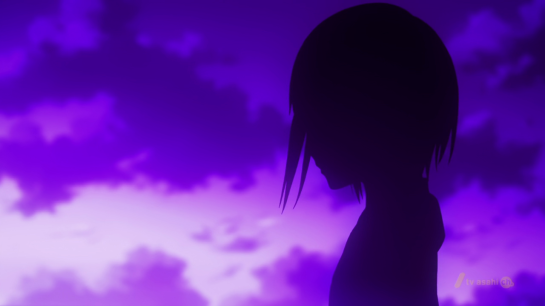The Fall 2012 season (which throws Dan back to March; cursed Australia) has been fairly promising so far. Of the many series we’re currently following, Shinsekai Yori has really won us over. In particular, the world it has established, with a seemingly omnipresent government, has captivated both of us.
Visually, the series is stunning. Even if it’s a simple classroom scene, Shinsekai impresses. The alternative style of the fables the children read in class hint at a deeper meaning, as well as effectively establishing a world where the children are not as free as they think. Scenes, such as Saki and Shun gliding over a perfect river at night, or the children’s game at sunset, really awe you and you can understand why the children are unaware of the tenebrous elements underlying this (outwardly) idyllic society.

Scenes such as these are truly breathtaking, and belie the true nature of the world of Shinsekai Yori.
And it is this underlying sense of wickedness – which we can only describe as creepy – in this picturesque world that has got us hooked on Shinsekai. The five children are rather unaware of the fact they’re constantly being monitored, despite it being obvious to us that their every move is being judged by something. Reiko suddenly disappeared because she hadn’t demonstrated sufficient control of her Cantus. The boy from group 3 also disappeared because he broke one of society’s most fundamental laws, and it would seem that a Tainted Cat, mentioned by Saki in episode 1, is responsible. Not only does this hint that more malevolent things are to come (the notion of young teens under constant surveillance and seemingly eliminated for undesirable traits is begging for the occurrence of terrible things), but simultaneously establishes an air of mystery. Is the government monitoring these children, or is it a supernatural force with its own will? And if it is the government, are they human, or have they lost their humanity?
Another point that comes to mind: are we, the audience, part of this surveillance? Are we the unconscious agents employed by the government to constantly watch these children and see their every move? The narrative of Shinsekai Yori places us in a deeply powerful and omnipresent position because we are privy to the actions of these children. They want to keep everything a secret from the adults, but by virtue of the fact that we, the watchers, know what is going on, these children are never truly unwatched, and the theme of entrapment and authority only deepens.
These questions are what’s keeping us hooked and eagerly anticipating the next episode.
It would appear the establishment is interested in the concept of eugenics, weeding out children to create a population which can fulfil some purpose. The population is merely a herd, being bred to realise the ruling power’s ultimate goal. Why else would subversive and substandard elements be eliminated, unless it is to create a perfect society? One which performs its function perfectly, that is. That children are subject to this selection process and are unaware of it firmly establishes the world of Shinsekai as a malefic one. Just how twisted the world is remains to be seen.
One of the most chilling things to see when you take a step back, is the children using their Cantus to control the animals they find in the woods in episode 3. The cycle of control is established by this fact, and the way the children control the crabs points towards a haunting reflection of the way higher forces in society control them. The childlike innocence and naivety they do this with becomes much creepier in the gigantic scheme of things; is this the way the government will treat them in the future as well?
Should Shinsekai continue on this path of posing questions about the warped governance (and answering them, of course), we feel it will remain a compelling and engrossing series. It would seem the adults of the world are fully aware of the dangers faced by youths, so at some point they must become aware of the “surveillance and selection system” in place, whether through being informed of them or experiencing the (what we can only assume will be) horrors first hand. We imagine Shinsekai will take the latter route, given the source material is reported to be dark and wonderfully complex, and if it can pull it off, we have a real winner on our hands.


